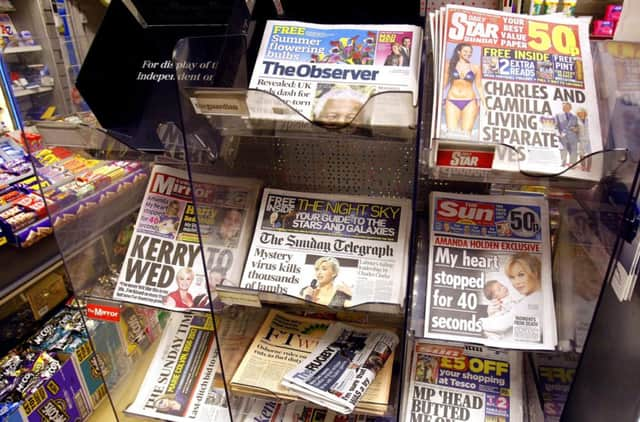Newspapers’ case for own royal charter thrown out


A senior judge in the Court of Appeal in London yesterday rejected applications brought by newspaper industry body Pressbof (the Press Standards Board of Finance) to take its case further.
Acting on the advice of the government, the Privy Council granted a charter last October in a form favoured by the three main UK political parties.
Advertisement
Hide AdAdvertisement
Hide AdPressbof argued in the Court of Appeal on Wednesday that the decision to reject the rival charter was unfair and unlawful.
But yesterday Lord Justice Maurice Kay, vice-president of the appeal court’s civil division, ruled that the process was “not unfair or even arguably so”.
High Court judges had previously ruled that the Pressbof case was “unarguable”.
Dismissing the applications, the judge said it was well known that “self-regulation of the press has been a matter of public controversy for some time”. Following the Leveson report “there was, and remains, controversy as to the way forward”. During the Court of Appeal hearing, Richard Gordon QC said Pressbof was not told the criteria and target it had to meet for its charter to win approval.
He said the target “was deliberately camouflaged” and criteria from the Department for Culture, Media and Sport (DCMS) were never made available until it was too late.
Mr Gordon said Pressbof had been “expressly denied sight of the DCMS criteria. We have never seen them despite a promise we would see them”.
He said the reason for the High Court refusing Pressbof permission to seek a judicial review last October – the decision it wanted to appeal – was the assertion that Pressbof knew the criteria it had to meet when applying for a royal charter.
Mr Gordon said that was incorrect and reflected “an impressionistic reading of the facts and a misunderstanding of the relevant context”.
Advertisement
Hide AdAdvertisement
Hide AdHe said the Pressbof charter was lodged to give effect to the spirit of Lord Justice Leveson’s recommendations following his public inquiry into the press in the wake of the News International phone-hacking scandal, and was designed to provide “a scrupulously fair process”. But the judge said yesterday that the core criteria must have been “obvious” to any informed person in the industry, and to say that it was denied the opportunity to submit a charter that would meet the criteria was “fanciful”.
The government has insisted the cross-party charter offers the press the best alternative to a system of full statutory regulation. Some publications have made it clear they will refuse to sign up to a system underpinned by a politicians’ charter.
Earlier this week, the Independent Press Standards Organisation (Ipso), the new press regulatory body backed by almost all national newspapers to succeed the criticised Press Complaints Commission (PCC), named Sir Alan Moses – an appeal court judge – as its first chairman.
Press reform campaign group Hacked Off, which supports the cross-party charter, said Sir Alan’s appointment “changes nothing” and described Ipso as a “dreadful insult” to victims of press intrusion.
Separate judicial review proceedings launched by Pressbof which directly challenge the legality of the cross-party charter were put on hold pending yesterday’s ruling.